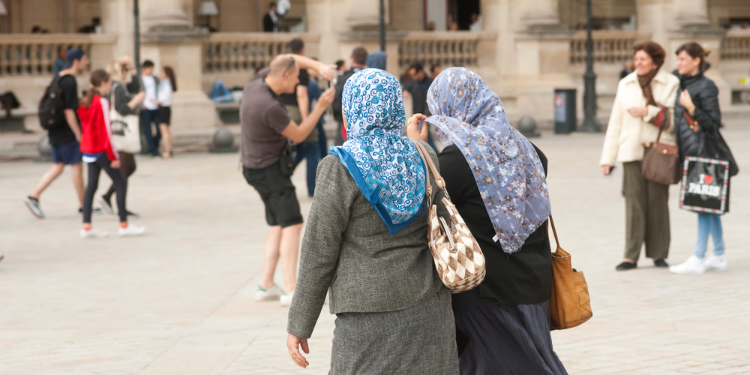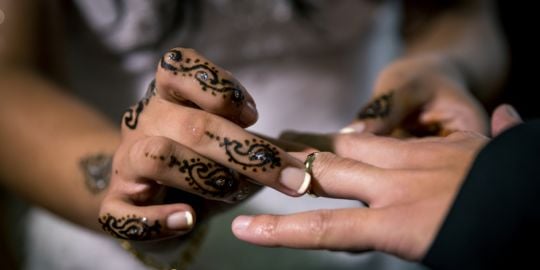Wearing the Hijab: Views differ across countries
Many women have chosen to move to the United Kingdom, Canada, the United Arab Emirates (UAE), Spain, the United States, and France. Among them are many graduates who wear the veil and see no career opportunities in their home countries. It's important to note that various forms of veils have varying degrees of coverage. This article focuses more on the hijab (a veil covering the hair and leaving the face visible), the most common and readily accepted in public spaces. The United Kingdom and Canada are often cited as countries tolerant of all religions.
Multiculturalism or 'integration' into the host country's culture
There are two primary models: multiculturalism, where all religions can freely express themselves in the public sphere, and integration, where cultural practices should blend into the "dominant culture" of the host country. Behind these models are two opposing views of secularism. As a reminder, secularism is based on the principle of separation between the Church and the State. The Church (religion) does not hold any political power. Secularism is also the right to practice one's religion freely. It indeed guarantees "equality before the citizens, regardless of their belief."
However, in some countries, the principle of secularism tends more to defend the State against religions. The freedom of worship remains but should not infringe on the expected neutrality in public space. This second vision of secularism tends to erase any signs of religious affiliation. But women who choose to wear the Islamic veil regret this vision. They feel stigmatized in France and even in Sweden. Meanwhile, German and Belgian laws are advancing on the issue. In Germany, the permission or prohibition of the veil is left to the discretion of the Länder. In 2023, a court decision allowed Muslim female teachers in Berlin to wear the hijab. In Spain, there is no state legislation concerning wearing the veil. As of 2021, the Muslim community in Spain was above 2 million. Teachers are increasingly allowed to wear the hijab, which shows their way of showing or appreciating tolerance.
Should you choose a country advocating multiculturalism to wear the veil freely?
Those who have chosen to relocate overseas insist on the toxic climate in their home country. For them, the situation has worsened in recent years with terrorist attacks, violence, etc. They denounce dangerous stereotypes, sometimes echoed by politicians. The same concerns arise when acts of violence are committed by individuals who are presented as Muslim. Expatriates wearing hijab talk about a challenging everyday life. They often have to deal with insistent stares on the street and hurtful words. They also speak of the lack of employment opportunities.
Many countries remain divided on the Islamic veil issue
In Europe, for example, many countries ban wearing the full veil. Wearing the hijab is also prohibited in some areas (it's worth noting that there are several types of veils), especially in the professional space. In some cases, the ban may extend to activities related to the public. For instance, a school may refuse to allow a mother wearing a hijab to be a parent helper for a school outing.
The United Kingdom and Canada are so often cited as references because of their openness. Veiled expatriates in these countries talk about a much more peaceful everyday life. They no longer feel stigmatized. They say they are less stressed and more confident about their career prospects. They can work with their hijab and access positions of responsibility. They see veiled journalists presenting the news on TV, pleading in court, teaching... These women who have succeeded abroad encourage prospective expats to take the plunge.
Discrimination remain present for expats in many countries
In New Zealand, women have been able to wear the hijab since 2020. The country joined the United Kingdom and Canada in integrating the hijab into the uniform of policewomen. For the New Zealand government, it was more about encouraging Muslim women to engage in policing. But Muslim expatriates still deplore a visible "hatred", even more so since the coming of the right-wing Luxon government, permeable to far-right ideas. On March 15, 2024, while commemorating the 5th anniversary of the Christchurch attack, the Prime Minister himself acknowledged that Muslims do not feel "safe" in New Zealand. Aliya Danzeisen, the national coordinator of the Islamic Women's Council, observes that such statements are followed by inaction.
Overall, veiled women who move abroad remain lucid. Racism and discriminatory practices persist, even in the most open countries. Some prefer an Islamic and open country, like the UAE. However, for the rest, moving abroad is also a way to show that it is possible to live in a foreign country with the hijab. They embed their approach in a daily fight for more tolerance and respect among people. However, many expatriates regret having to leave their country to live peacefully. In fact, this has been one of the reasons for brain drain for many years.
Wearing the Hijab: The plight of French Muslims and expats in France
In August 2023, just before the school year, Gabriel Attal, then Minister of National Education, decided to ban the abaya and qamis, traditional garments worn by men and women. Attal considers these long robes to be a religious sign. The current Prime Minister totally assumes this measure. The problem is that these garments are primarily traditional outfits. Moreover, it can be difficult to differentiate them from other long dresses. The "abaya affair" is one of the latest revealing France's very strict position on its concept of secularism. According to opponents of the measure, this position too strict and stigmatizing for French people of Maghrebi origin and the Muslim community.
While France remains a land of immigration, it has taken a "right turn" that divides. Sociologists Alice Picard, Julien Talpin, and Olivier Esteves point out that more and more young French graduates of Maghrebi origin and/or Muslim faith are choosing to move abroad. In France, it is believed that these graduates are increasingly experiencing racist attacks and discrimination due to their religion and/or origins. Discrimination has been on the rise, according to them, with terrorist attacks. Since then, each tragedy rekindles tensions. These expatriates talk about an Islamophobic climate that closes all doors to them despite their degrees, when it comes to finding a job or a home. Muslim women wearing the veil talk about hostile looks, prejudices, and derogatory remarks.
These graduates leave France for Luxembourg, Spain, the United Kingdom, Canada, and the United States, or more welcoming Islamic countries like the United Arab Emirates (UAE). However, sociologists believe this form of brain drain still has to be studied in depth.
















